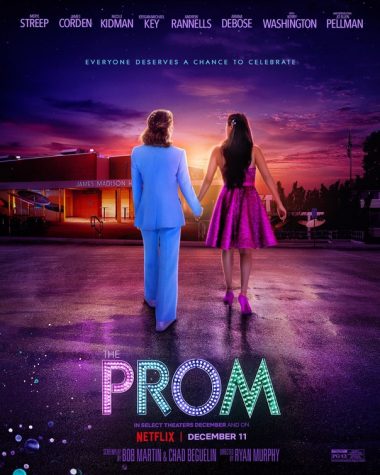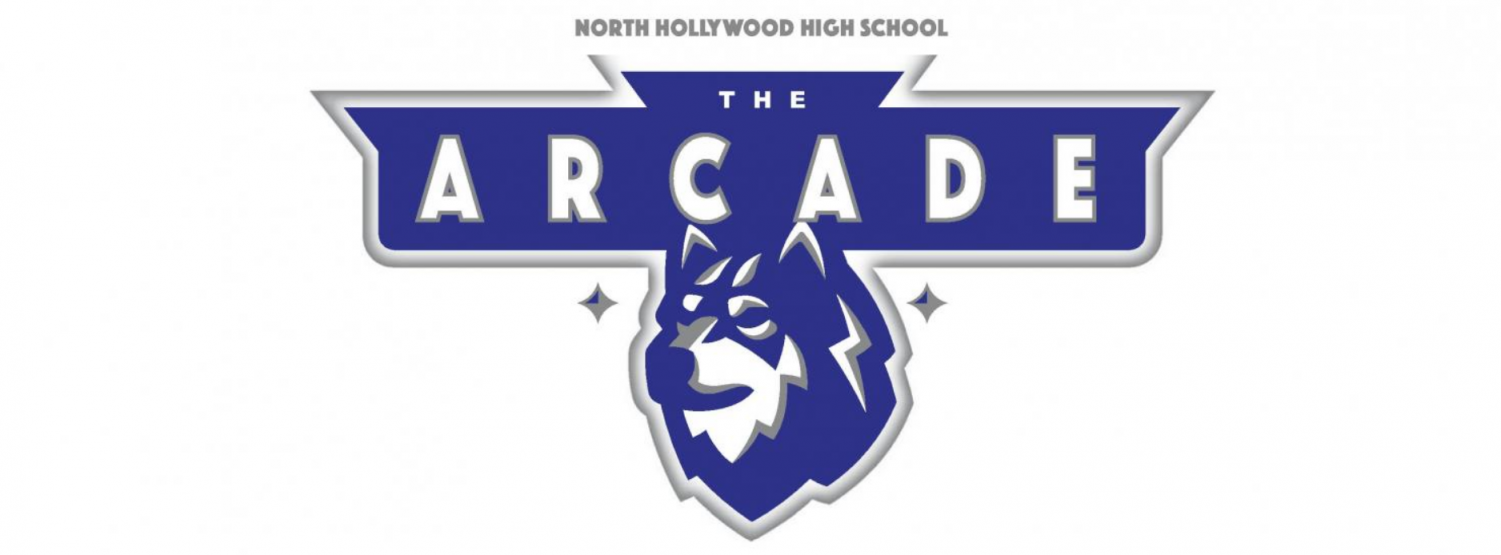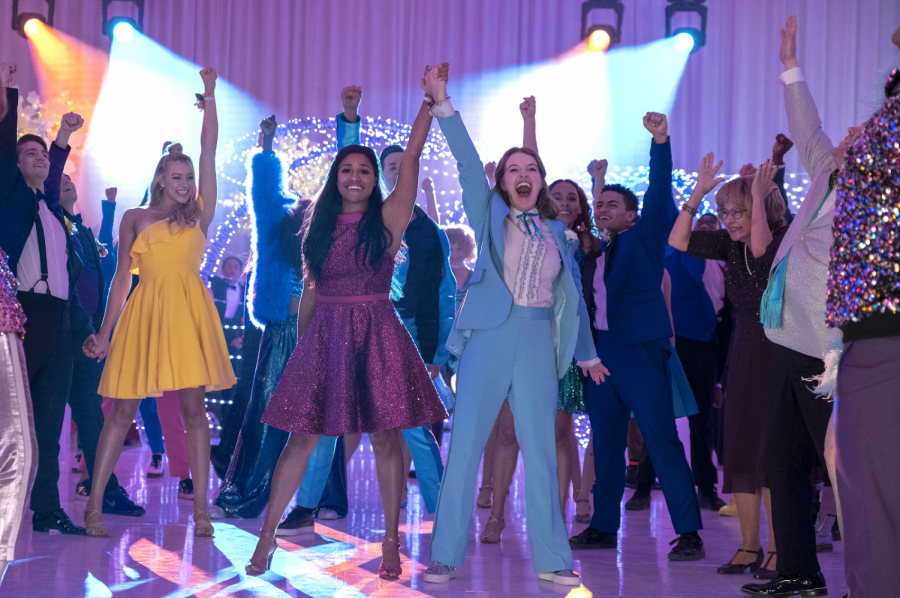Promoting a Piece of Prominence
Review of the musical “The Prom”
Prom: a dance that symbolizes the culmination of high school, a place where almost everyone wants to attend. This includes Emma Nolan, a lesbian who’s banned from attending due to her small-town community of Edgewater, Indiana not accepting her sexuality.
Meanwhile, on Broadway, actors Dee Dee Allen and Barry Glickman receive negative reviews for their newest musical. These reviews are mainly attributed to them being well-known narcissists.
In order to save their public image, the actors need to find a cause to help out. This is where worlds collide, as the actors attempt to do all that they can to help Emma’s situation, and in turn themselves.
This is the main plot for the Musical/Comedy film “The Prom.” Along with smaller subplots, it’s a gorgeous tale of how everyone should be treated equally.
Aside from the plot, other noteworthy elements of the movie include the characters, the actors and their performances, the costume and set design, the songs and dances, the jokes, and the camerawork.
The characters in this film include the previously mentioned Emma Nolan, Dee Dee Allen, and Barry Glickman, along with other characters who altogether make the movie work so wonderfully: Angie Dickinson, Trent Oliver, Alyssa Greene, Ms. Greene, Sheldon Saperstein, and Mr. Hawkins.

Emma Nolan is the only outed lesbian at her school, creating a community of bigoted chaos that sets the movie in motion. She’s constantly torn between being a symbol for change and being a regular teenager, creating a complex character we can all root for.
Next is Dee Dee Allen, an actress who mainly wants to help in order to save her image, but slowly develops into a more likable character, showing progression throughout the film.
Dee Dee’s costar Barry Glickman has had a similar experience as Emma with his homosexuality and acts as one of her mentors throughout the film.
Another one of Emma’s mentors throughout the film is Angie Dickinson, an actress who wishes to break into bigger roles.
Someone who wishes to be cast in roles to move on from his past as an actor on an old sitcom is Trent Oliver. His main role is to change the way the small town thinks about homosexuality.
Emma’s secret girlfriend throughout the film is Alyssa Greene. She’s a straight-A student involved in many aspects of the school, and for this is scared to reveal her sexuality until late in the film.
Ms. Greene, the mother of Alyssa Greene, wishes to ban Emma from attending prom as the head of the PTA. She’s a micromanaging parent with many conservative viewpoints.
Sheldon Saperstein acts as the manager of Dee Dee Allen who works hard to fix her public image. He’s seldom seen throughout the film but makes a rather large impact when present.
Lastly, Mr. Hawkins, the principal of the high school, sides with Emma in trying to get her accepted into the prom. He also acts as a fan and the love interest to Dee Dee Allen.
All these characters and more combined lead to a story with a rich complexity. It makes the film stronger and provides a wide range of representations.
The cast of the film is star-studded! It includes (in order of characters presented) Jo Ellen Pellman, Meryl Streep, James Corden, Nicole Kidman, Andrew Rannells, Ariana DeBose, Kerry Washington, Kevin Chamberlin, and Keegan-Michael Key.
Each of these actors’ performances was marvelous, many coming from musical backgrounds which made the film even better! The only casting decision that probably should’ve been changed was James Corden.
While James Corden’s performance was incredible, he’s not actually gay which can be a bit offputting. Casting someone who’s actually gay could’ve possibly added a layer of realism that the character is lacking in the final product.
In an article from the LA Times, Corden’s performance was described as “aggressively flamboyant,” “homophobic,” “stereotypical” and “grossly inappropriate”. It’s safe to assume that casting agents will take note of this for the future to come.
Moving forward, the costume design of the movie is breathtaking. The costumes are so colorful and they fit the characters so perfectly to the point where it becomes a significant part of their identity.
The set design doesn’t lack too far behind. The built sets look as beautiful as butterflies, and the on-location sets are masterfully picked to send the viewer into the world of the film!
A real magnet to view the film are the masterfully crafted song and dance numbers. It really entrances the audience into feeling the raw emotions of the performances!
A sour note of the film can be a lot of the jokes presented. Much of the humor relies on stereotypes, which for a movie advocating against bigotry can be a bit distasteful.
An example of this includes a scene where Barry asks Emma where her pickup truck is, and she responds back with something along the lines of “Because I’m a lesbian, I drive a pick-up truck?” While it’s said in a playful manner, it can still be a bit cringeworthy for the audience to endure two hours worth of humor such as this.
Lastly, the camerawork utilized throughout the film is spectacular. With a whole host of different shots and angles, it always leaves the viewer with a fresh perspective of the world.
The overall feel of the film is to call it a near-masterpiece. While it excels at virtually everything (the plot, the characters, most of the actors and their performances, the costume and set design, the song and dance numbers, and the camerawork), there are a few aspects that could’ve been improved upon (the casting of James Corden and a lot of the comedy).
Your donation will support the student journalists of North Hollywood High School. Your contribution will allow us to purchase equipment and cover our annual website hosting costs.

